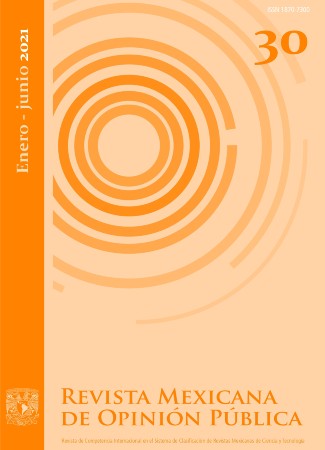<strong>The Public Opinion Survey As a De-Ideologizing Instrument</strong>
Main Article Content
Abstract
A civil war poses problems for social scientists that demand an immediate solution, but also others, less urgent, although perhaps more basic. Among these is the ideological concealment of reality from the population, which enhances its alienation, by separating the daily experience from its corresponding objectification, its experiential consciousness from its necessary formalization. The systematic and dialectical use of public opinion polls can help to dismantle the lie of the official discourse and open a collective conscience to new historical alternatives. The proposal is examined in the light of surveys carried out in the midst of the Salvadoran civil war, which show the disagreement between public discourse and real opinion on such serious issues as US intervention, the role of elections and the option for a dialogue of peace between government and insurgents.
Article Details
Citas en Dimensions Service
References
GLEN, Norval D. y FRISBIE, W. Parker, “Trend Studies with Survey Sample and Census Data”, Annual Review of Sociology, núm. 3, Annual Reviews, Nueva York, EE. UU., 1977, pp. 79-104.
MARTÍN-BARÓ, Ignacio, Acción e ideología. Psicología social desde Centroamércia, Universidad Centroamericana José Simeón Cañas (UCA), San Salvador, El Salvador, 1983.
MARTÍN-BARÓ, Ignacio, Psicología social, Universidad Centroamericana José Simeón Cañas (UCA), San Salvador, El Salvador, 1984.
MARTÍN-BARÓ, Ignacio, “Un psicólogo social ante la guerra civil en El Salvador”, Revista de la Asociación Latinoamericana de Psicología Social, núm. 2, Asociación Latinoamericana de Psicología Social, D. F., México, 1982, pp. 91-111.
MARTÍN-BARÓ, Ignacio y ORELLANA, Víctor Antonio, “La necesidad de votar. Actitudes del pueblo salvadoreño ante el proceso electoral de 1984”, Estudios Centroamericanos, núms. 426-427, Universidad Centroamericana José Simeón Cañas (UCA), San Salvador, El Salvador, 1984, pp. 253-264.
MATTELART, Armand, La comunicación masiva en el proceso de liberación, Siglo XXI, Buenos Aires, Argentina, 1973.
MONTERO, Maritza, Ideología, alienación e identidad nacional, Ediciones de la Biblioteca, Caracas, Venezuela, 1984.
SPIELBERGER, Charles D., SARASON, Irwin G. y MILGRAM, Norman A. (eds.), Stress and Anxiety, vol. 8, Hemisphere, Washington, D. C., EE. UU., 1982.
STEIN, Barry N., “The Refugee Experience: Defining the Parameters of a Field of Study”, International Migration Review, vol. 15, núm. 1-2, Center for Migration Studies of New York, Nueva York, EE. UU., 1981, pp. 320-330.
SUDMAN, Seymur, “Sample Surveys”, Annual Review of Sociology, núm. 2, Annual Reviews, Nueva York, EE. UU., 1976, pp. 107-120.
TAJFEL, Henri, Grupos humanos y categorías sociales, traducción de Carmen Huici, Herder, Barcelona, España, 1984.
ZÚÑIGA, Ricardo B., “La sociedad en experimentación y la reforma social radical”, en MARTÍN-BARÓ, Ignacio (comp.), Problemas de psicología social en América Latina, Universidad Centroamericana José Simeón Cañas (UCA), San Salvador, El Salvador, 1976.

Revista Mexicana de Opinión Pública por Universidad Nacional Autónoma de México se distribuye bajo una Licencia Creative Commons Atribución-NoComercial-SinDerivar 4.0 Internacional.
Basada en una obra en http://revistas.unam.mx/index.php/rmop.


